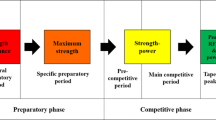Abstract.
Isometric skeletal muscle fatigue is usually assumed to be a linear process based upon the monotonic decrease in spectral frequency of the EMG. Since spectral analysis by fast Fourier transform (FFT) constitutes a linear transformation of the data, the present study was designed to reevaluate the time-course of muscle fatigue with a nonlinear tool, recurrence quantification analysis (RQA). Surface EMG recordings were obtained from the multifidus muscle of 17 human subjects during isometric posture-holding of the upper torso. The process of muscle fatigue was found to be linear for 59% of the subjects by FFT criteria, but nonlinear for 76% by RQA criteria. As a demonstrative control, both slow and fast transients occurring within a nonlinear mathematical process could be accurately depicted by RQA, but not by FFT. It is concluded that assessment of EMG patterns by nonlinear techniques can give insight into the time-course of fatiguing muscles attributed to the summation of several nonlinear and competing processes.
Similar content being viewed by others
Author information
Authors and Affiliations
Additional information
Received: 12 November 1998 / Accepted in revised form: 29 November 1999
Rights and permissions
About this article
Cite this article
Ikegawa, S., Shinohara, M., Fukunaga, T. et al. Nonlinear time-course of lumbar muscle fatigue using recurrence quantifications. Biol Cybern 82, 373–382 (2000). https://doi.org/10.1007/s004220050591
Issue Date:
DOI: https://doi.org/10.1007/s004220050591




